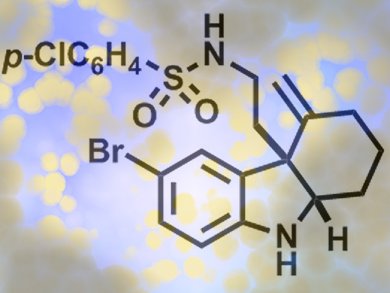Staphylococci aureus (MRSA) are pathogenic bacteria that cause skin infections, respiratory diseases, and food poisoning. β-lactam antibiotics, a broad class of drugs containing a β-lactam ring, are the first-line therapy against these pathogens. Through natural selection, however, some bacterial strains have become resistant to β-lactam antibiotics, thus, alternative treatments are required.
A promising treatment consists of resistance-modifying agents (MRAs), compounds that resensitize resistant bacteria to common antibiotics. To develop novel MRAs, Jessica Podoll and colleagues, University of Colorado, Boulder, USA, synthesized and screened a library of polycyclic indole alkaloids, a large class of nitrogen-containing compounds. Using this approach, the researchers obtained a tricyclic indoline named Of1 (pictured). This novel compound resensitized numerous multidrug-resistant Staphylococcus aureus strains to several β-lactam antibiotics, such as methicillin, amoxicillin/clavulanic acid, cefazolin, and imipedem.
- Bio-inspired synthesis yields a tricyclic indoline that selectively resensitizes methicillin-resistant Staphylococcus aureus (MRSA) to β-lactam antibiotics,
J. D. Podoll, Y. Liu, L. Chang, S. Walls, W. Wang, X. Wang,
Proc. Natl. Acad. Sci. USA 2013.
DOI: 10.1073/pnas.1310459110




